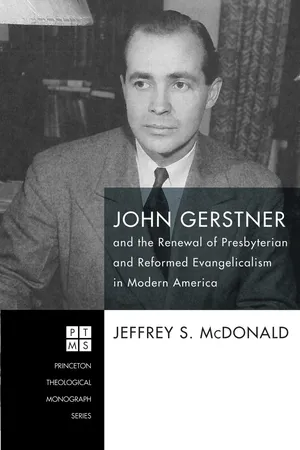1
Introduction
John Henry Gerstner Jr. was born in 1914 and raised primarily in Philadelphia, Pennsylvania. As a young adult he became a member of the United Presbyterian Church of North America (UPCNA) and was actively engaged in Christian ministry, but he also pursued scholarship. He excelled in his academic studies. In 1945 he received a PhD from Harvard University and then began to devote energy to stimulating evangelical thinking in the church and in the academy. He published widely in various journals and periodicals; moreover, he authored numerous books. In his later years the lectures that Gerstner delivered for a para-church ministry were recorded and transmitted through new forms of multimedia. His specialty was Jonathan Edwards (1703–1758), the great colonial American theologian and philosopher. Today he is perhaps best remembered in academic circles for his voluminous writings on Edwards’s theology. Yet Gerstner is also known for his work on Reformed apologetics, the cults, and biblical inerrancy. In addition, he wrote on the history of Presbyterianism and evangelicalism. He was an active and well-known writer and churchman, but this study represents the first comprehensive analysis of his life and thought.
During Gerstner’s career he involved himself in various Presbyterian and evangelical events and controversies that shaped his reputation. The main impulse in Gerstner’s career was injecting conservative evangelical Presbyterian modes of thought into the mainline northern Presbyterian church, but Gerstner also directed efforts more broadly and became a leader in the evangelical movement at large. This study will demonstrate just how much the Pittsburgh professor achieved in his career. He was a strong advocate for his views. Expressions of Gerstner’s resolution revealed both personal strengths and weaknesses and this book will identify the ways in which Gerstner’s militancy both helped and hurt his career and scholarly reputation. Analyzing the scholar’s setbacks and disappointments yields particularly cogent insights into Gerstner’s life experiences. Gerstner’s tireless work was ended only by his death in 1996.
In 1993, three years before John Gerstner died, a friend wrote a letter to him asking for a “status report from your perspective” on the future of classical Reformed “apologetics.” Gerstner responded by saying that while he was “disappointed” with the progress, “ [w]e dare never underestimate our sovereign God, or rely much on our own very limited vision.” Gerstner’s foresight may have had limits, but his large vision of the Reformed faith was realized in significant ways through his many years of energetic teaching, preaching, and writing. Indeed, for over fifty years, he had labored to revitalize and strengthen Presbyterian and Reformed evangelicalism. Even though the influence of the movement had waned in the northern Presbyterian Church (USA) during the 1920s, Presbyterian and Reformed evangelicalism remained within the mainline church and thrived in some older and newly founded Reformed denominations, ministries and schools. Gerstner played a leading role in propelling this Calvinist-orientated evangelicalism into the future. His efforts in this endeavor have been largely ignored, however, and his significance has not been realized. This study analyzes Gerstner’s life and thought in relation to the history of the mainline Northern Presbyterian church and the burgeoning evangelical movement and reveals his importance in pre- and post- World War II American religion.
The church historian played a leading role in the post-World War II expansion of evangelicalism through his teaching in both mainline and non-mainline Protestant schools. Unlike most other evangelical scholars who associated themselves with the neo-evangelical movement, Gerstner spent the majority of his career at a mainline Protestant seminary, which during the 1960s and 1970s had a largely progressive ethos. Gerstner’s strategy was to provide an evangelical voice in this context and to spread his influence to the other evangelical schools in which he taught. Many students viewed him as a challenging professor as he used the Socratic method to ensure that students had mastered their assigned coursework. Throughout his career he was a dynamic preacher, lecturer, and speaker who spoke forcefully. He had a somewhat gruff voice, which was caused by an asthmatic condition that made him strain as he talked. His fervent messages and his reputation as an excellent speaker allowed him to gain a hearing for conservative theology. As a strong proponent for evangelical beliefs he was not easily dismissed and his opponents knew that he had a sharp intellect.
Gerstner eschewed liberal and neo-orthodox theology in an era when these two theological viewpoints dominated mainline Presbyterian seminary faculties. He could be gracious and charitable, but was uncompromising in his evangelical stance. His conservatism was not always appreciated by others. As a professor of church history and as an evangelical Presbyterian, he stood squarely for what he regarded as the classical Reformed and evangelical position. Comparatively, his life and thought are similar to those of W. Stanford Reid (1916–1996), the stalwart evangelical Canadian Presbyterian historian and renewal leader. Both men were graduates of Westminster Theological Seminary (Pennsylvania), church historians, and mainline evangelical Presbyterian leaders. During Gerstner’s long career, he sought to pass on to his readers, students, hearers, and followers a blend of the conservative Calvinist Old Princeton theology combined with the powerful thought of Jonathan Edwards (1703–1758). While many today likely regard this as a strange mixture of differing theological viewpoints, Gerstner attempted to argue for continuity between the legendary New England theologian and the doctrinal doyens of Old Princeton. As an evangelical scholar, he set forth his views in print and refused to allow his beliefs to be marginalized by the mainline northern Presbyterian Church. He engaged in open debate with the leading Presbyterian theologians challenging their agenda for the church. Gerstner also stirred up excitement for Reformed theology in small Presbyterian denominations and in the wider evangelical movement. He helped to create new evangelical renewal organizations and institutions. Gerstner becomes a fascinating historical figure of study partly because he had an uncanny...
